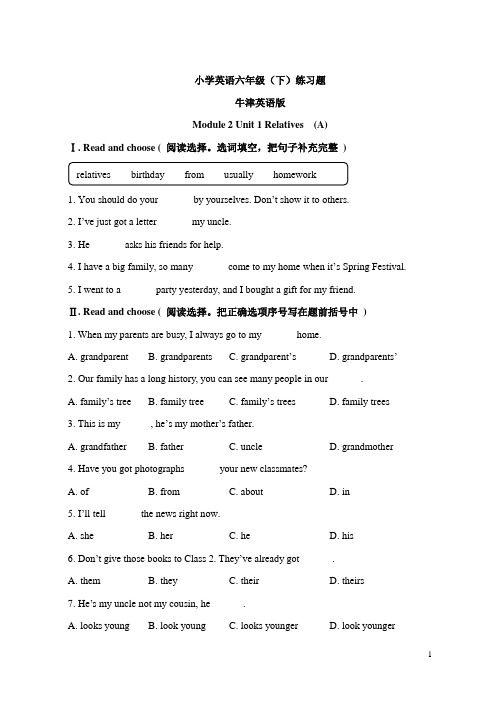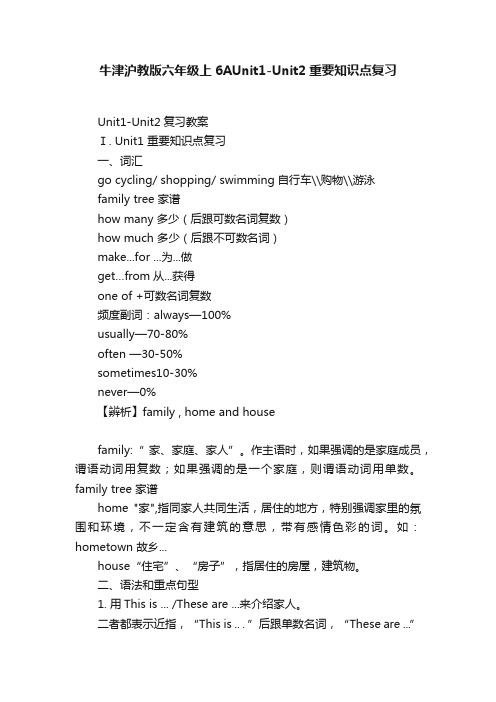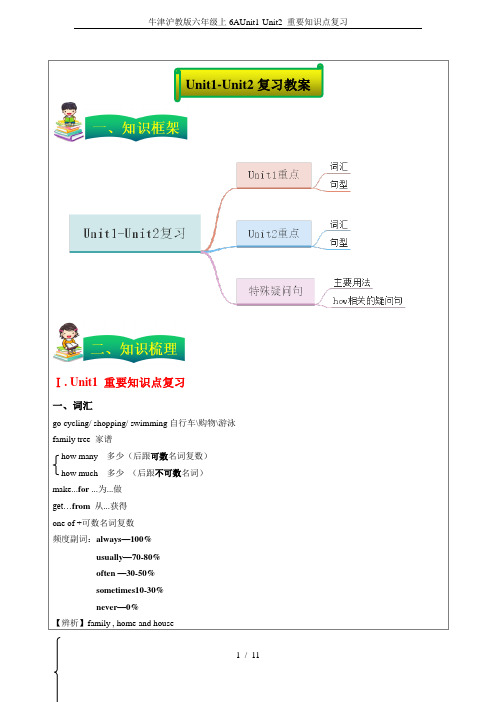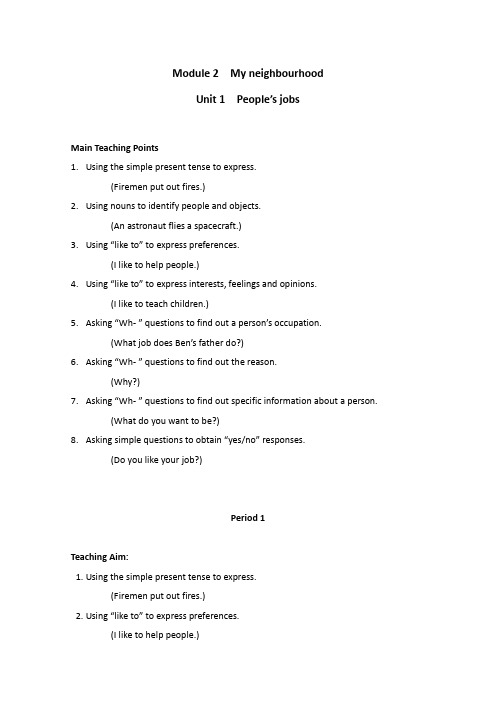牛津英语6Am2u1
- 格式:doc
- 大小:38.50 KB
- 文档页数:5

小学英语六年级(下)练习题牛津英语版Module 2 Unit 1 Relatives (A)Ⅰ. Read and choose ( 阅读选择。
选词填空,把句子补充完整)relatives birthday from usually homework1. You should do your ______ by yourselves. Don’t show it to others.2. I’ve just got a letter ______ my uncle.3. He ______ asks his friends for help.4. I have a big family, so many ______ come to my home when it’s Spring Festival.5. I went to a ______ party yesterday, and I bought a gift for my friend.Ⅱ. Read and choose ( 阅读选择。
把正确选项序号写在题前括号中)1. When my parents are busy, I always go to my ______ home.A. grandparentB. grandparentsC. grandparent’sD. grandparents’2. Our family has a long history, you can see many people in our ______.A. family’s treeB. family treeC. family’s treesD. family trees3. This is my______, he’s my mother’s father.A. grandfatherB. fatherC. uncleD. grandmother4. Have you got photographs ______ your new classmates?A. ofB. fromC. aboutD. in5. I’ll tell ______ the news right now.A. sheB. herC. heD. his6. Don’t give those books to Class 2. They’ve already got ______.A. themB. theyC. theirD. theirs7. He’s my uncle not my cousin, he ______.A. looks youngB. look youngC. looks youngerD. look younger8. My dad always does the housework ______ my mum.A. withB. toC. aboutD. of9. –How ______ do you tidy your own room? –Never.A. farB. longC. oftenD. soon10. –What ______ you ______ in your winter holiday? –Wow, that was wonderful.I went to Hainan for a trip.A. do, doB. have, doneC. did, didD. did, doⅢ. Read and write ( 根据句意及首字母提示,填入所缺单词)1. I’ve got a cute n_ _ _ _ , she’s in the kindergarten now.2. We give Christmas c_ _ _ _ when that holiday comes.3. People often write d_ _ _ first when they write a letter in English.4. My teacher asked us to read the text, and then c_ _ _ _ _ _ _ _the table below.5. Let’s know a_ _ _ _ you, so we can get along with each other better.Ⅳ. Read and match ( 选出正确应答)()1. How about going hiking this summer holiday?()2. What do you want for your birthday?()3. How many cousins do you have?()4. Do you always tell your parents about your school?()5. In your family, what are you?A. Not really, I don’t like to share my school life with them.B. That’s a good idea.C. I’ve got two.D. I’m the daughter, the sister.E. Well, a bike will be very fine.Ⅴ. Read and judge ( 阅读短文,判断正误。

牛津小学英语6A Unit 2 (第一课时)教案教学目标
•能够听懂并模仿课文对话
•能够正确朗读并理解单词及课文中的句子
•能够用英语形容动物
•能够用英语描述动物的特征和能力
教学准备
•大黑板/白板和黑板/白板笔
•教材:牛津小学英语6A Unit 2 Lesson 1教材
•学生练习册:牛津小学英语6A Unit 2 Lesson 1练习册
•录音机或多媒体设备
教学流程
导入新课(10分钟)
1.Greeting and warm-up: 与学生互相问候并引入本课主题,询问学生最喜欢
的动物。
2.Presentation: 通过图片或实物展示一些动物,帮助学生回忆和学习动物的名称。
新课内容(25分钟)
3.Listening: 播放课文录音,要求学生仔细听录音并跟读。
然后再次播放录音,学生边听边填写正确的动物名称。
4.Vocabulary: 教师通过幻灯片或黑板展示课文中的新单词,并帮助学生正确
发音和记忆。
5.Chant: 教师指导学生一起朗读课文中的chant部分,并帮助学生理解和记忆chant中的单词和句子。
随后,学生分组进行跟读练习。
6.Pair work: 学生分为小组,互相提问并回答有关动物的问题。
教师可以提供一些问题的模板,如。


牛津沪教版六年级上6AUnit1-Unit2重要知识点复习Unit1-Unit2复习教案Ⅰ. Unit1 重要知识点复习一、词汇go cycling/ shopping/ swimming自行车\\购物\\游泳family tree 家谱how many 多少(后跟可数名词复数)how much 多少(后跟不可数名词)make...for ...为...做get…from从...获得one of +可数名词复数频度副词:always—100%usually—70-80%often —30-50%sometimes10-30%never—0%【辨析】family , home and housefamily:“ 家、家庭、家人”。
作主语时,如果强调的是家庭成员,谓语动词用复数;如果强调的是一个家庭,则谓语动词用单数。
family tree 家谱home "家",指同家人共同生活,居住的地方,特别强调家里的氛围和环境,不一定含有建筑的意思,带有感情色彩的词。
如:hometown 故乡...house“住宅”、“房子”,指居住的房屋,建筑物。
二、语法和重点句型1. 用This is ... /These are ...来介绍家人。
二者都表示近指,“This is .. . ”后跟单数名词,“These are ...”后跟复数名词或者多个不同的对象。
2.用how many 来询问数量后接可数名词的复数形式,当我们提问你有多少……时候,如果How many后跟人,常用how many... do you have?如果How many 后跟物,常用how many...have you got?3.What do you do with your... ? 和What else do you do with your... ? 来提问与家庭成员或亲戚一起做什么.else 意为别的其他的,常用于特殊疑问词或不定式之后,如what else, something else等。

Unit1-Unit2复习教案Ⅰ. Unit1 重要知识点复习一、词汇go cycling/ shopping/ swimming自行车\购物\游泳family tree 家谱how many 多少(后跟可数名词复数)how much 多少(后跟不可数名词)make...for ...为...做get…from从...获得one of +可数名词复数频度副词:always—100%usually—70-80%often —30-50%sometimes10-30%never—0%【辨析】family , home and housefamily:“ 家、家庭、家人”。
作主语时,如果强调的是家庭成员,谓语动词用复数;如果强调的是一个家庭,则谓语动词用单数。
family tree 家谱home "家",指同家人共同生活,居住的地方,特别强调家里的氛围和环境,不一定含有建筑的意思,带有感情色彩的词。
如:hometown 故乡...house“住宅”、“房子”,指居住的房屋,建筑物。
二、语法和重点句型1. 用This is ... /These are ...来介绍家人。
二者都表示近指,“This is .. . ”后跟单数名词,“These are ...” 后跟复数名词或者多个不同的对象。
2.用how many 来询问数量后接可数名词的复数形式,当我们提问你有多少……时候,如果How many后跟人,常用how many... do you have?如果How many 后跟物,常用how many...have you got?3.What do you do with your... ? 和What else do you do with your... ? 来提问与家庭成员或亲戚一起做什么.else 意为别的其他的,常用于特殊疑问词或不定式之后,如what else, something else等。

Module 2 My neighbourhoodUnit 1 People’s jobsMain Teaching Pointsing the simple present tense to express.(Firemen put out fires.)ing nouns to identify people and objects.(An astronaut flies a spacecraft.)ing “like to” to express preferenc es.(I like to help people.)ing “like to” to express interests, feelings and opinions.(I like to teach children.)5.Asking “Wh- ” questions to find out a person’s occupation.(What job does Ben’s father do?)6.Asking “Wh- ” questions to find out th e reason.(Why?)7.Asking “Wh- ” questions to find out specific information about a person.(What do you want to be?)8.Asking simple questions to obtain “yes/no” responses.(Do you like your job?)Period 1Teaching Aim:1. Using the simple present tense to express.(Firemen put out fires.)2. Using “like to” to express preferences.(I like to help people.)3. Asking “Wh- ” questions to find out a person’s occupation.(What job does Ben’s father do?)4. Asking “Wh- ” questions to find out the reason.(Why?)Teaching Materials:1.Book 6A Page 172.Cassette 6A & Cassette player3.Some photos (people & jobs)Teaching Procedure:1.Pre-task preparation: (5 minutes)Hello class, today we’ll learn Module 2 Unit 1: People’s jobs. I know actually it is too early to talk about “job” with you, but I think most of your parents have their jobs. For instance: My job is a teacher. I teach the students English. So, who can tell me what job does your father or mother do?Oh, I’ve heard a lot of jobs. Now, I’ve some questions for you to answer. (Whole class)1) Whose father is an engineer? 2) Whose mother is a public servant?3) Whose father is a business man? 4) Whose mother is a nurse?5) What does a doctor do? 6) What does an accountant do?2. While-task procedure1) Listen to the tape and answer the questions. (5 minutes)Now, let’s listen to the tape but not open your books. Think it over: Who visit Rose Garden School? (Yes, Mark’s father visits Rose Garden School. Ben and Kitty are also in this school. )Now, let’s go on listening. What are they talking about? (They are talking about Mark’s father’s job)2) Let the students open the books and talk about the pictures and then do T/F question on Page 17 below. (10 minutes)Now, open your books and turn to page 17.1. What job does Mark’s father do? (He is a fireman.)2. What does he usually do? (He usually drives a fire-engine and put out fires.)3. Does Mark’s father like his job? (Yes, he does.)4. Why? (Because he likes to help people and put out fires.)3) Read after the tape twice. (5 minutes)4) Explain some useful words and phrases. (5 minutes)a. put out firesb.fire-engine &firemanc. Firemen put out fires.d. What job does Ben’s fathe r do?3. Post-task activity (10 minutes)Now, it’s your turn. I’ll give you 3 minutes to prepare. Make a dialogue about jobs (whether your parents/uncle/auntie/brother/sister) but use the patterns and phrases we’ve learnt just now.4.HomeworkWorkbook Page 8。
小学牛津英语6B Module 1 Unit 4教案Unit 4 Staying healthyteaching requirements Knowledge objective:I 词组1.stay healthy = keep healthy 保持健康2.indoor activities 室内活动3.outdoor activities 室外活动4.like dancing 喜欢跳舞5.like running 喜欢跑步6.enjoy swimming 喜欢游泳7.love sports 喜欢运动8.love playing 喜欢玩9.forget working 忘记工作10.play and work 工作与玩耍11.do puzzles 玩拼图游戏12.go fishing 去钓鱼13.go cycling 去骑车14.go swimming 去游泳15.go on a picnic 去野餐16.watch television 看电视17.see a film 看电影18.read a book 看书19.play computer games 玩电脑游戏20.play tennis / badminton 打网球/羽毛球21.play basketball in the playground 在操场上打篮球22.play the piano 弹钢琴23.make a model 制作模型24.have a barbecue 进行一次烧烤25.fly kites 放风筝26.health problem 健康问题27.have a headache 头疼28.have a stomach ache 肚子疼29.have a cold 感冒30.have a fever 发烧31.have a sore throat 喉咙疼32.have toothache 牙疼(注意没有“a”)33.I’m afraid 恐怕(表示婉转语气)34.too much + 不可数名词太多35.too many + 可数名词36.too little+ 不可数名词太少37.too few + 可数名词38.watch too much television 看太多的电视(*watch television for too long)39.watch less television 看少一点电视40.wear enough clothes 穿足够多的衣服41.*put on 穿上42.wear more clothes 穿更多的衣服43.eat too much spicy food 吃太多的辛辣食物44.have exercise 做运动45.once a day 一天一次46.twice a week 一周两次47.three times a month 一个月三次48.go to bed late 晚睡49.go to bed early 早睡50.practise swimming 练习游泳51.*practise doing sth. 练习做某事52.help do the housework 帮助做家务53.*help sb. (to) do sth./ help sb. with sth. 帮助某人做某事II. 词性转换1.act (v.) — activity (n.)— activities (pl.) — *active (a.)e.g. We take part in all kinds of activities.He is very active in class.2.health (n.) — healthy (adj.) — unhealthy (a.)e.g. Health is the most important thing.You should eat healthy food.Eating too much ice cream is unhealthy.3.real (adj.) — really (adv.)e.g. It’s really cold today.He who doesn't reach the Great Wall is not a real man.4.tooth (n.) — teeth (pl.) —toothachee.g. Too much sweet food is bad for your teeth and you’ll have toothache.5.fun (n.)—* funny (a.)e.g. The children had fun at the beach yesterday.It’s a funny story.6.many/much (a. ad.) —moree.g. You should drink more water.7.little — less; few — fewere.g. You should watch less television.8.one — once; two — twicee.g. I go to school once a week.III. 语言点/句型1. stay1) *stay healthystay保持,相当于keep, 后接形容词2) stay with his cousinstay逗留2. like / love / enjoy + doing1) enjoy后加名词或动名词e.g. Tom enjoys the film.He enjoys running.* enjoy oneself = have a good time 玩得高兴2) like to do / like doing前者强调某一具体行为,后者则强调抽象概念或某一类事物e.g. I like to read his novel.I like reading.3. forget doing sth. 忘记做过某事*forget to do sth.忘记去做某事e.g. He forgot to close the window.I will never forget my 14th birthday.* remember to do sth. 记得去做某事*remember doing sth.记得做过某事4. play basketball; play the piano球类运动前不加the, 而乐器前要加the5. favourite (adj.) = like…best 最喜爱e.g. I like doing puzzles best. = Doing puzzles is my favourite.6. 用动名词来表述一些活动的名称e.g. swimming, making a model7. --- Why do I always have a headache?--- It’s because you watch too much television, I’m afraid.1) 对because引导的从句,只要求理解和模仿操练,不做语法分析。
Unit 2 Good friendsPeriod 1Teaching aims:1.To find out the age ,heights and weights of their classmates and write a report.2. To draw a picture of a friend and write about him/her.3. To write a report about the things they usually do with their friends.Language focus and language function1. Using adjectives to make comparisons.2. Using adverbs to express frequency.3. Using “like to” to express preference.4. Using the simple tense to express actions.Teaching procedure:I. Warming-upDaily duty-work or othersII. Pre-task preparation1. Review: “dog” and “block” by showing the pictures to the students on the board( Try to remember the different housing estate the classmates live in)T: Who lives in ( name of a housing estate)?Who lives in the same housing estate?Do S1 and S2 live in the same housing estate?To elicit: Yes, they live in the same housing estate.No, they live in different housing estate.2.The whole class complete: “Look, Ask and Answer”T: Which dogs are the same?To elicit: The dogs in cage AT: Which dogs are different?To elicit: The ones in cage B3. Distribute a cope of photocapiable page 9 to each student to identify which animals in the pet shop are the same and which are different.III. While-task procedure1. Play the recording: Look and Read Students listen and follow in their books.2. Play the recording again Students listen and repeat3. Give the students a few minutes to read the passage silently.4. Ask the students to read the five sentences in Answer True/false.5. Tell the students to close their booksT: Who is your good friend?How old is he/she?What do you like to do together?To elicit: _________is my good friend. He /She is _______ yeas old. We always /usually /sometimes ________ together.6. Distribute a copy of Photocopiable page 10 to each student to tick the things they and theirfriends do together. Then they write them in complete sentencesIV. Consolidation:Grammar practice Book A Page 4-5.。
6A Module 2 Places and activitiesUnit1 What would you like to be?{课标要求与教材分析}根据《英语课程标准》二级要求,本单元课标要求为:能在图片的帮助下听懂和读懂有关职业的对话,并用英语表述自己的意愿以及理由;能根据图片或提示书写相关职业的单词,及表述自己是否想成为其中一员的句子;能听录音并进行有关职业的对话练习,并能试着写一些句子,表述自己对某种职业的看法,并说出理由。
牛津教材6A,Module2 Places and activities 包括四个单元的内容,Unit1 What would you like to be? Unit2 0pen Day Unit3 Going to school Unit4 Rules around us,都是围绕school这一场所展开不同的活动。
不难看出,Module2整个模块是在3A、4A、5A基础上的一个提升。
就M2U1What would you like to be?这一单元而言,是在3A 讲授地点名词,a classroom, school, library, school things的基础上拓展到4A 的rope, hoop, 以及室内形状的名词,再到5A所讲到How do you go to school?可以看出教材的编写具有层次性,递进性,在复现旧知的基础上,逐步出现新知。
句型也是如此,由简单的句型What’s this? Is this the…? 拓展到4A的How many…? There are… 5A的句型How do you go to school? 还有6A要讲到的What would you like to be? 这个新句型在之前的学习中都没有出现过,所以教学时要逐步去引导学生理解并加以运用,学习用适当的答语进行对话,由浅入深提高学生的语言表达能力。
Unit2主要是围绕学校这个活动场所,谈论开放日的一些工作安排,内容主要是学习一般将来时,了解如何用一般过去时表示过去发生的事情。
Unit3讲的是围绕学校这一话题,复习去学校的方式,学习新句型 It takes me sometime to get there.Unit4 围绕学校及其他的活动场所讲述情态动词must,并复习否定祈使句。
{学情分析}(1)学习水平分析本节课授课对象为六年级上半学期的小学生,这一年龄段的孩子在活泼好动的基础上认识水平有了较大的发展,积累了一定的生活的经验;学生的个性呈现出独立张扬的一面,明显有了独立的思想,爱展现自我;在知识构成上,经过三年多牛津英语的学习,已掌握了不同话题的不少语言点。
因此教师就需要将孩子们丰富的想象力和创造力运用于英语课堂上,利用学生已有的生活经验,激发孩子们的创新思维,即或孩子们的语言积累,提供并拓展语言的平台,让孩子们在学习的过程中,体验到创造的乐趣。
(2)学习需要分析学生需要学习策略的培养及学生持久兴趣的养成,就要求教师在教学设计时更应精心设计,达到巧教、趣教。
学生在已有经验的基础上学习这一课的内容,学起来会比较的轻松。
只要设计合理的情景,适当的活动,学生学习起来会非常的有意思,能够激发学生的积极性和主动性,达到“寓教于乐”的课堂效果。
{教学目标}1.能听,说,认读单词 secretary, bank, clerk, policewoman, dentist, would like to, because, make, safe, driver, interview, job, sick, better, start, work, finish,age 并能学习用一般疑问句Would you like to be a/an…?提问你想要成为一名……吗?并能够做出肯否定回答。
学习用特殊疑问句What would you like to be? 提问并回答。
学习用特殊疑问句Why? Why not?提问并回答。
并能了解一些有关采访的相关信息。
2.学生在“猜职业”,“小组问答”及“小记者”的活动中,了解各种不同的职业,在这样的活动中学习并巩固相应的词汇和句型。
3.学生在学习职业及小组合作的过程中,能够乐于参与,积极表达,树立人人为我,我为人人的职业思想意识。
第一课时 Look, listen and number Listen and say{教学目标}学生能围绕第六届“中博会”这一主题出发,听、说、认、读单词“secretary, bank, clerk, policewoman, dentist, would like to, because, make, safe, driver,和句型What would you like to be? Would you like to be a/an…? Why? Why not? Because…学生在“猜职业”,“小组问答”的活动中, 了解各种不同的职业,掌握相应的句型,准确用英语表达自己的职业志向,逐步形成有效的英语思维能力。
通过本课的学习,学生逐步树立热爱山西,热爱太原,热爱学校的情感,树立人人为我,我为人人的职业意识。
{教学重点与难点}重点:掌握四会词secretary, bank, clerk, policewoman, dentist, would like to, because, make, safe, driver难点:四会句What would you like to be? Would you like to be a/an…? Why? Why not? Because…{教学方法与手段}本课学习的是职业,重点是了解并介绍相关的职业特点,所以我主要采用情景教学法,并配合TPR教学法来呈现单词加深学生的印象,学生对于全英文课堂理解时会有一些难度,借助这种方法可以使学生的理解直观形象化。
此外,我还借助录音机、卡片、CAI课件以及一些实物来拓展教学资源。
{使用教材的构想}对于牛津教材来讲,词汇量大,语法知识点多,句型结构多变,是其明显的特点,怎样能使学生掌握如此多的内容呢?那就是以旧引新。
本节课我紧紧围绕第六届中博会这一盛事为主题,为了这次盛会的顺利召开,我们山西各行各业都积极投身到这一活动中,以此来学习有关职业的词汇,学生可能根据以往的经验,已经掌握了一定的词汇,在此基础上,以旧引,学习新词汇,a secretary, a bank clerk, a dentist 围绕这一情景,以小记者的身份进行问答训练,操练新句型What would you like to be? Would you like to be a/an…? Why? Why not? Because…在真实的情景中讲解新知识,符合课表标中提到的新课程倡导任务型的教学模式,让学生在教师的指导下,通过感知、体验、实践、参与和合作等方式,实现任务的目标。
通过这样一个完整连贯的情景, 学生可以有效地进行语言的集中学习,提高了课堂的时效性。
在本课的教学中,我将根据高年级学生的特点,通过猜谜、快速抢答、小记者等一系列活动为学生创设一个丰富的课堂氛围。
{教学流程}Ⅰ. Warmer(5分钟)1.GreetingsT: Hello, boys and girls. How are you?Ss: I’m fine, thank you.2.T: (Point to the calendar) On September 26th I went to a place. Can you guess where it is.Ss: Answer.T: Great. I went to visit EXPO CENTRAL CHINA.【设计意图:本课开始时,和学生打招呼,营造讲英语的语境,设法让学生进入学英语的状态。
介绍中博会,一方面可以激发学生的热情,另一方面为讲下文作好了铺垫。
】LeadingsT: (PPT) let’s enjoy some pictures about EXPO. What can you see in this video?Ss: We can see……T: Good job. We can see many venues. We can see policemen, actors, drivers…【设计意图:通过观看刚刚举办过的第六届中博会的图片,让学生感受中博会的气势宏伟,另一方面也向学生展示,为了这次中博会各行各业的人们都付出了艰辛的劳动,为学下文的有关职业的词作了铺垫。
】Ⅱ.Presentation(30分钟)T: (PPT) From this activity, we can see some people, they cook some nice food for us and foreign friends. What do they do?Ss: They are cooks.T: (Bb) cook. (PPT)In the EXPO, There are a lot of people from different places. If they want to buy some Chinese things, who can help them?Ss: A bank clerk.T: (Bb) A bank clerk. Work in groups and talk about “ in the EXPO , which people can we see?Ss: Work in groups and talk, then write.【设计意图:通过观看ppt,我们看到了各行各业的人服务于中博会,通过描述的方法让学生猜是哪种职业,可以锻炼学生听说的能力,另一方面可以给学生以指引,用英语解释英语。
在讲完两种职业后安排学生小组活动,突出了导学自悟的主题,让学生开动脑筋,可能会有哪些人服务于中博。
】T: Who can tell me? Please choose one student from your group and answer it. Ss: policeman, policewomanT: What do they do in the EXPO?Ss: They …T: Well done. Now look what do they do?Ss: They are pilots , firemen, postmen, shop assistants.T:(PPT) What does he do?Ss: He is a dentist.T: (Bb)a dentist(PPT)What does she do?Ss: She is a secretary.T: In this EXPO, we can see many people. Let’s read these words together.【设计意图:通过小组讨论的结果让学生汇报,学生可以从汇报的过程中感受有这么多人,这么多行业服务于中博,同时很自然的锻炼了学生的口语表达能力,根据学生已知的知识来学习新知识,大大降低了学生的难度。